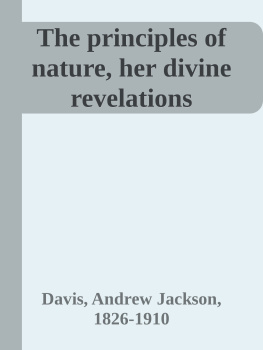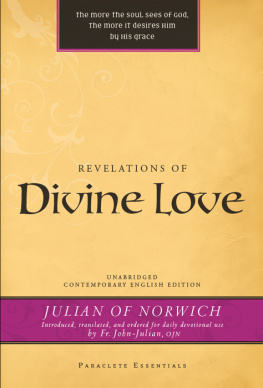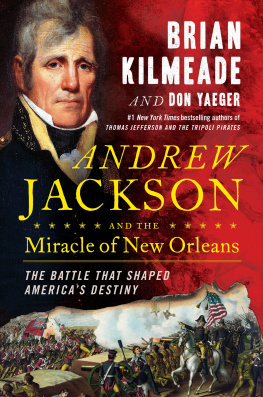Andrew Jackson Davis - The Principles of Nature, Her Divine Revelations, and a Voice to Mankind
Here you can read online Andrew Jackson Davis - The Principles of Nature, Her Divine Revelations, and a Voice to Mankind full text of the book (entire story) in english for free. Download pdf and epub, get meaning, cover and reviews about this ebook. year: 1847, publisher: S. S. Lyon and Wm. Fishbough, genre: Science fiction / Religion. Description of the work, (preface) as well as reviews are available. Best literature library LitArk.com created for fans of good reading and offers a wide selection of genres:
Romance novel
Science fiction
Adventure
Detective
Science
History
Home and family
Prose
Art
Politics
Computer
Non-fiction
Religion
Business
Children
Humor
Choose a favorite category and find really read worthwhile books. Enjoy immersion in the world of imagination, feel the emotions of the characters or learn something new for yourself, make an fascinating discovery.
- Book:The Principles of Nature, Her Divine Revelations, and a Voice to Mankind
- Author:
- Publisher:S. S. Lyon and Wm. Fishbough
- Genre:
- Year:1847
- Rating:5 / 5
- Favourites:Add to favourites
- Your mark:
- 100
- 1
- 2
- 3
- 4
- 5
The Principles of Nature, Her Divine Revelations, and a Voice to Mankind: summary, description and annotation
We offer to read an annotation, description, summary or preface (depends on what the author of the book "The Principles of Nature, Her Divine Revelations, and a Voice to Mankind" wrote himself). If you haven't found the necessary information about the book — write in the comments, we will try to find it.
The Principles of Nature, Her Divine Revelations, and a Voice to Mankind — read online for free the complete book (whole text) full work
Below is the text of the book, divided by pages. System saving the place of the last page read, allows you to conveniently read the book "The Principles of Nature, Her Divine Revelations, and a Voice to Mankind" online for free, without having to search again every time where you left off. Put a bookmark, and you can go to the page where you finished reading at any time.
Font size:
Interval:
Bookmark:

AND

PART FIRST.
Any theory, hypothesis, philosophy, sect, creed, or institution, that fears investigation, openly manifests its own error.
PART SECOND.
Reason is a flower of the spirit, and its fragrance is liberty and knowledge.
PART THIRD.
When distributive justice pervades the social world, virtue and morality will bloom with an immortal beauty; while the Sun of Righteousness will arise in the horizon of universal industry, and shed its genial rays over all the fields of peace, plenty, and human happiness!
THIRD EDITION.
PUBLISHED BY S. S. LYON, AND WM. FISHBOUGH.
FOR SALE, WHOLESALE AND RETAIL, BY J. S. REDFIELD, CLINTON HALL.
Entered, according to Act of Congress, in the year 1847,
By SILAS S. LYON, AND WILLIAM FISHBOUGH, in the Clerks Office of the District Court of the United States, in and for the Southern District of New York.
STEREOTYPED BY REDFIELD & SAVAGE,
SCRIBES INTRODUCTION.
BIOGRAPHICAL SKETCH OP THE AUTHOR, AND HISTORY OP THE PRODUCTION OF THIS VOLUME.
A work of unprecedented character is here presented to the world. It consists of the consecutive reasonings and revelations of a spirit freed, by a certain physical process, the philosophy of which is explained, from the obstructing influence of the material organization, and exalted to a position which gave access to a knowledge of the structure and laws of the whole material and spiritual Universe. It treats upon subjects of the profoundest interest and of the most unspeakable importance to the human race; and as its claims are confessedly of the most startling character, and its professed disclosures, with the phenomena attending them, are in some respects unparalleled in the history of psychology, it is certainly no more than just that the world should be furnished with a plain, concise, yet circumstantial account of the author of the book, with a history of its origin and production, and with the means of either verifying or refuting what is said concerning the source from which it sprang, and the means employed in its production. A few preliminary remarks, however, are deemed proper as introductory to the statements herein to be submitted.
It is obvious to every intelligent mind that the condition of the human race, socially, nationally, mentally, and spiritually, is continually changing. There is at present no civilized nation upon the globe which does not present a totally different aspect as to manners, customs, social structure, science, art, religion, and all the conventionalisms of life, from any nation existing upon the earth four thousand years ago. Every period of human history shows, upon the whole, a distinct progress in the condition of mankind beyond that of previous periods. Instances of apparent retrogression, as in the cases of the various catastrophes that have occurred at different periods during the geological history of the earth, only exhibit the apparent disorder incident to a transition from a lower to a higher state of development. In passing through the uncouth semi-barbarism of the early ages to the refinements and intellectual and artistic attainments of the nineteenth century, the race has of course passed through every intermediate stage of cultivation; and a close observation and analysis will prove that every decided stage of human progress has been accompanied by new and distinct mental and social wants ; and in order that these might be duly supplied, new resources have been invariably opened, and new instrumentalities have been instituted.
It would require but little argument, therefore, aside from the fact that change is perpetual, to prove that the mental and social wants of the present differ essentially from those of any previous generation. Perhaps at no period in the worlds history so little characterized by revolutionary violence, has the general mental and social condition of mankind undergone changes so marked and conspicuous as during the last century. In respect to all matters of science , particularly, has there been an immense unfolding; and the mechanical and economic arts have been correspondingly improved. The seven seals of the great geological book have been broken, and its rocky leaves have disclosed the physical history of the earth for millions of years. Powerful telescopes have penetrated the abysses of space, and the grandeur and harmony of the Universe have been unfolded to an extent far transcending all previous conception : and the researches in the departments of chemistry, physiology, and comparative anatomy, are constantly proving more and more conspicuously that all things are but parts inseparably connected in one grand System. All these sublime results of science tend to expand the mind beyond the narrow circle of which self is the centre, and to unite the soul with those things which it beholds, contemplates, and admires. Man is thus made deeply sensible that he is a mere atom in infinite space, surrounded by beings and creations unspeakably more important than himself; and as he contemplates the wide-spread fields of creation, teeming with tokens of impartial favor, a flame of philanthropy is enkindled in his soul that consumes all narrow prejudices and selfish inclinations, and he sympathizes with universal Man as the great Body of which he is a mere organ.
Such are the moral and social tendencies of the science of the age, even considering the same in the more abstract point of view. But from the same source more important influences indirectly arise. From the materials of science the busy hand of mechanism is forming filaments to bind together the extremities of each nation, and is developing the resources, exchanging the commodities, and harmonizing the interests, of every clime. Iron steeds, nerved by the stimulus of the expanding vapor, are plunging through the ocean, measuring the distance between the two hemispheres by the lapse of a few days, or prancing to and fro in the earth, facilitating exchanges and promoting friendly intercourse between all communities and people. The imponderable elements have been laid under contribution, and, by the subtle agency of the electric fluid, man converses with his neighbor at the distance of a thousand miles with the same facility with which two would converse a few rods apart. The veins, and arteries, and nerves, of the great Body of humanity, are thus being developed, in the form of steamships, and railroads, and magnetic telegraphs, and its muscles and sinews are being unfolded in the form of labor-saving and productive machinery. And all science and art tend powerfully to extend the fibres and channels of communication thus being unfolded, throughout the whole earth, and thus to form of the whole race one harmonious Body , possessing one common spring of action, one common social and theological system, and bound together with one chain of sympathy running through all its diversified parts.
Such, we say, are the conspicuous and powerful tendencies of all the scientific and artistic attainments of the age. But to these tendencies there exist the most powerful obstructions, which have thus far defied all attempts of philanthropists and reformers to remove. These obstructions consist in the local prejudices, and the social, national, commercial, and theological antagonisms , that prevail throughout the whole earth. All men and communities are anxious for the establishment of a more intimate unity in the race, but each desires that this unity should be founded on the basis of his own peculiar system. The Calvinist would have the whole world form one harmonious brotherhood, possessing one faith, one hope, and one baptism, but then he would have them all Calvinists; the Arminian desires the same union, but only on the basis of his own theological system. The Catholic desires that all should become Catholics, and only on this ground will he consent to a union with others. The Jews desire a unity of the race, but they desire first to be restored to the land of Palestine, and then that all Gentile nations should unite as their subordinates under the reign of their expected Messiah. The intelligent Mohammedan desires the establishment and perfection of the universal brotherhood, but he demands that every man should first devoutly exclaim, Allah is God, and Mohammed is his prophet. And the same remarks might with equal propriety be extended to all parties, sects, denominations, and religionists, throughout the whole earth. All are equally sincere in their opinions, and equally zealous in their proclamation, each believing that his own system is sanctioned by the Deity; though as the devotees of all social, national, and especially theological systems, derive their opinions from the fortuitous circumstances of birth and early education, it is impossible that more than one out of the thousand can be right, and the extreme probability is that all are wrong. And while the followers of each system pray fervently and labor diligently for the conversion of the whole world, all are mutually and purposely obstructing the efforts of each other; and the obstruction creates impatience, jealousy, bigotry, fanaticism, and every species of hostility and persecution that now so unhappily distract the human race, and array brother against brother, and community against community, causing the truly philanthropic soul to weep in hopeless despondency.
Font size:
Interval:
Bookmark:
Similar books «The Principles of Nature, Her Divine Revelations, and a Voice to Mankind»
Look at similar books to The Principles of Nature, Her Divine Revelations, and a Voice to Mankind. We have selected literature similar in name and meaning in the hope of providing readers with more options to find new, interesting, not yet read works.
Discussion, reviews of the book The Principles of Nature, Her Divine Revelations, and a Voice to Mankind and just readers' own opinions. Leave your comments, write what you think about the work, its meaning or the main characters. Specify what exactly you liked and what you didn't like, and why you think so.













